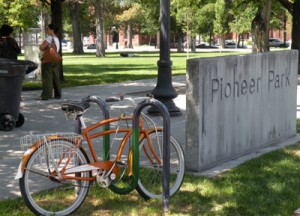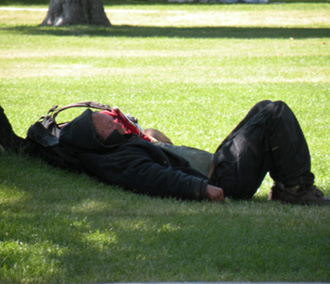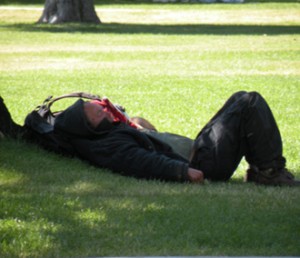Poverty in America and What the Church Can Do – by Karen Keene
Each day my drive to work takes me from the suburbs to downtown Salt Lake City. As I get off the freeway and round the corner towards my office, I drive by Pioneer Park where many homeless people sleep and spend their day. As I drive by, I both marvel at their resilience and shudder at the fact that they’ve slept on cold concrete or wet grass in the cold Utah nights. Then I drive by the corner where the day laborers wait for work – mostly men who are trying to eke out a small living by taking day jobs, many times in unsafe conditions with risk of injury or not getting paid. Just before I turn into my parking lot, I pass the shelter where people are already outside, lined up for breakfast, visiting with those around them, getting ready for their day. As I finish my drive and park my car, I pray for all those who are homeless and my heart is heavy with the knowledge that so many people are in such desperate need of help. Then finally, I give thanks for all those who are actively reaching out to lend a hand, to offer hope – the case workers, social workers, homeless outreach workers, therapists, administrators, volunteers, donors, and all those who care about those in most need in our society.
The faces of those in poverty are right in front of us if we look. On any given night in the United States of America, there are 643,067 people who are homeless and don’t have a place to live. Included in this number is approximately 50,000 homeless youth. (National Alliance to End Homelessness). On any given day in the United States of America, there are 6.7 million households who don’t have enough to eat. (WorldHunger.com) How can this be in the richest country in the world? Why are there so many people without homes, without enough food to eat, without jobs, without health care, without basic necessities? And what are we, as Christians, called to do in response to this overwhelming need?
For direction, we turn to the Bible. The Bible is clear about how important it is to help those in need. According to the Poverty and Justice Bible published by the American Bible Society, poverty and justice is mentioned over 2,000 times in the bible. God has plenty to say to us about these two issues. The Old Testament is full of stories and references to caring for the poor, the widow, the ill, those in need. Jesus began his public ministry in the Gospel of Luke 4:18 by reading from Isaiah 61: “The Spirit of the Lord is upon me, because he has anointed me to bring good news to the poor. He has sent me to proclaim freedom for the prisoners and recovery of sight for the blind, to release the oppressed, to proclaim the year of the Lord’s favor.” Up front, at the beginning of his ministry Jesus included the poor and the oppressed. Throughout his ministry he made it clear that the poor were of value which was a counter-cultural idea for those in power at the time (and this still applies today).
At the end of Jesus’ ministry on earth he was teaching the disciples and in Matthew 25:34-40 said “Then the King will say to those on his right, ‘Come, you who are blessed by my Father; take your inheritance, the kingdom prepared for you since the creation of the world. For I was hungry and you gave me something to eat, I was thirsty and you gave me something to drink, I was a stranger and you invited me in, I needed clothes and you clothed me, I was sick and you looked after me, I was in prison and you came to visit me.’ “Then the righteous will answer him, ‘Lord, when did we see you hungry and feed you, or thirsty and give you something to drink? When did we see you a stranger and invite you in, or needing clothes and clothe you? When did we see you sick or in prison and go to visit you?’ “The King will reply, ‘Truly I tell you, whatever you did for one of the least of these brothers and sisters of mine, you did for me.’
Jesus made it clear that we are called to feed the hungry, welcome the stranger, take care of the sick and those in prison – to care for the least of these in society. He commanded us to do so. Who are the least of these? The homeless man on the corner? The child without enough food to eat? The family displaced by a natural disaster? The woman who became ill and lost her job? The single mom working two part time jobs and trying to provide for her family?
There is so much need in our local communities, in our country, and around the world. It is difficult to know how or where to help and sometimes it is easier to not get involved. As Christians and part of the body of Christ we are called to get involved, to help where we can both in our communities and around the world. There are many ways to do this. First of all become educated, learn about the issues. Understand the causes of poverty – unemployment and underemployment, unaffordable housing, inadequate or no health care, illness or disability, inadequate income, lack of education, mental illness, substance abuse, domestic violence, there are many underlying causes. Advocate for those in need. People in poverty don’t have a voice, they don’t have lobbyists. Our elected officials need to know that the needs of those in poverty are important. They need to be encouraged to not dismantle the safety nets that are so critical for those in poverty.
Many programs are in place that work well in helping people in poverty and they need to be preserved. One program that is working well in Salt Lake City and around the country is Housing First. In Utah as in many states across the country, this model has been adopted which takes people off of the street, out of homelessness, and into housing. Once they are housed, they receive case management to assist them in staying in housing. Job training, health care, substance abuse treatment, mental health treatment are just some of the areas that they can receive assistance with. The goal is to house people, stabilize them, and then help them develop skills and provide resources to move them towards self-sufficiency. There have been many people positively impacted by this program and I’d like to share a story about just one man who had been on the street for many years. He was given an apartment in one of the initial Housing First programs for the chronically homeless. With support from staff and his case managers, he obtained a job as a gardener. This job, along with having a safe place to live and treatment for his addictions, provided stability in his life. A year and a half later, he was engaged to be married, still employed, moved into his own apartment, and no longer needed supportive services. What a transformation and what a blessing for him. This is just one of many, many examples of this program that provides basic necessities, a place to live, and hope. The program is a partnership between federal, state, and local governments as well as non-profits. It is clearly making an impact in the community and on the lives of the people that are participating in it.
Supporting organizations which help people in poverty by donating money and volunteering can be a life changing response to Jesus’ call. There are so many ways to get involved such as donating food, preparing meals, gathering coats and socks, serving in a program, volunteering on a board, teaching life skills, caring for children, visiting the sick, sharing your faith, reaching out to an individual in great need…..the list goes on and on. Mother Teresa said, “To show great love for God and our neighbor we need not do great things. It is how much love we put in the doing that makes our offering something beautiful for God.” Reaching out to someone, sharing God’s love through our actions is a powerful witness. God calls us to act with love and compassion where we find suffering. Mother Teresa also said, “There is a tremendous strength that is growing in the world through… sharing together, praying together, suffering together, and working together.” When we volunteer, our actions benefit and uplift both the person receiving the act of service as well as the person who is serving and brings us together to strengthen our world. And when we reach out to someone in need, we are the hands and feet of Christ.
In closing, I want to share a story. Early in the morning on September 11, 2011, several women gathered on a lovely early fall day for a sunrise service. This may have looked like gatherings all over the country, but it was different in a significant way from the typical church gathering. I was part of a gathering of a few staff and women from a transitional living facility who came together to share the beautiful sunrise and reflect on how 9/11 had changed us. These women, who were homeless and dealing with addiction, were so thankful to be participating in a sunrise service where they could share their faith and have a safe place to share how they had responded to the changes that had taken place in their lives. It was like so many other gatherings of women I have attended – some eager to share, some more quiet, some very emotional, others very well-spoken and intellectual. At the end of the service, each person received a personalized hand blessing. Many of the women were emotional and all of us were moved by the experience. We all came together in that place as children of God who were loved for who we are. Some of us were there as volunteers and some as clients, but in those moments, we were all one and we were all blessed by the experience.
We are called to be the hands and feet of Christ, to help the “least of these” in our world. When we advocate on behalf of those in poverty, when we donate our time and resources, and give ourselves in service, we can have a tremendous impact on our communities and the lives of individuals who are living in poverty.


